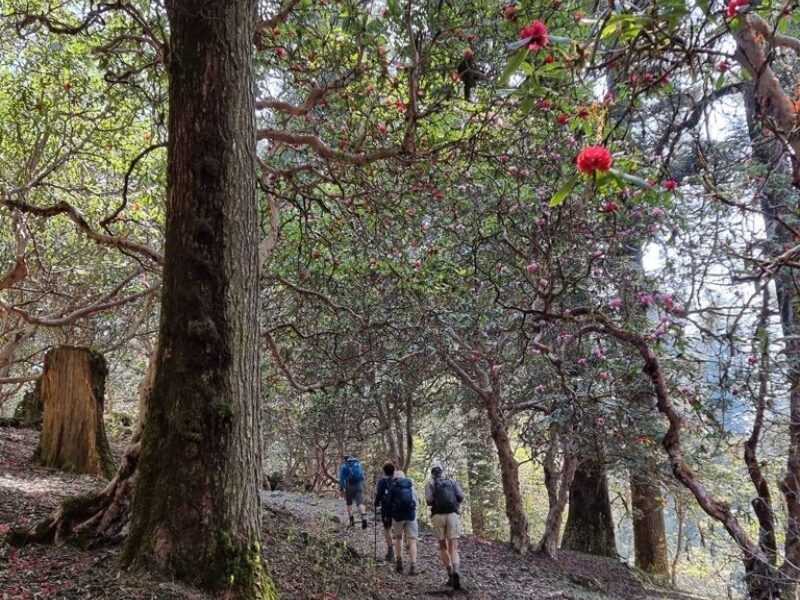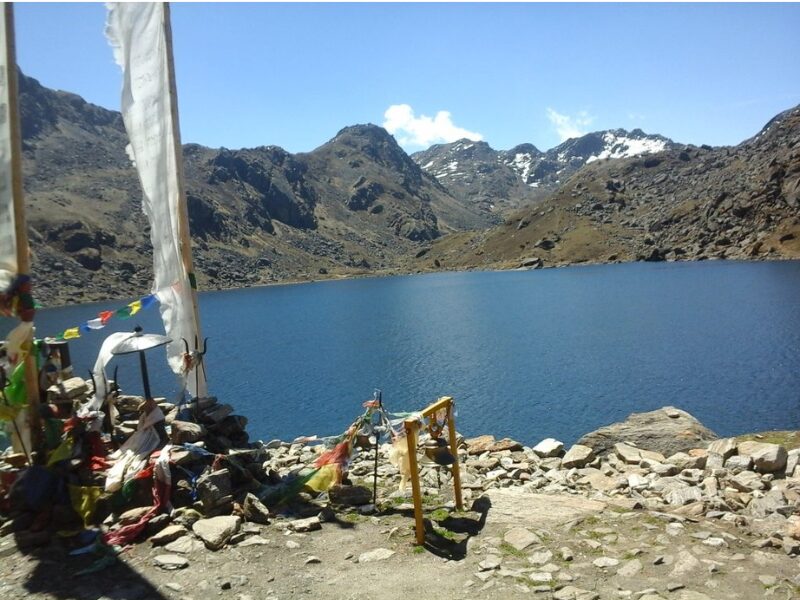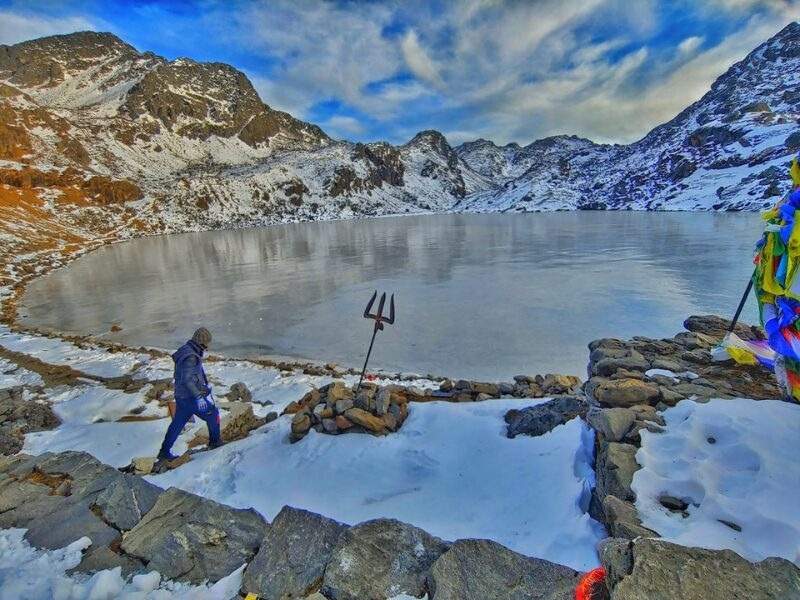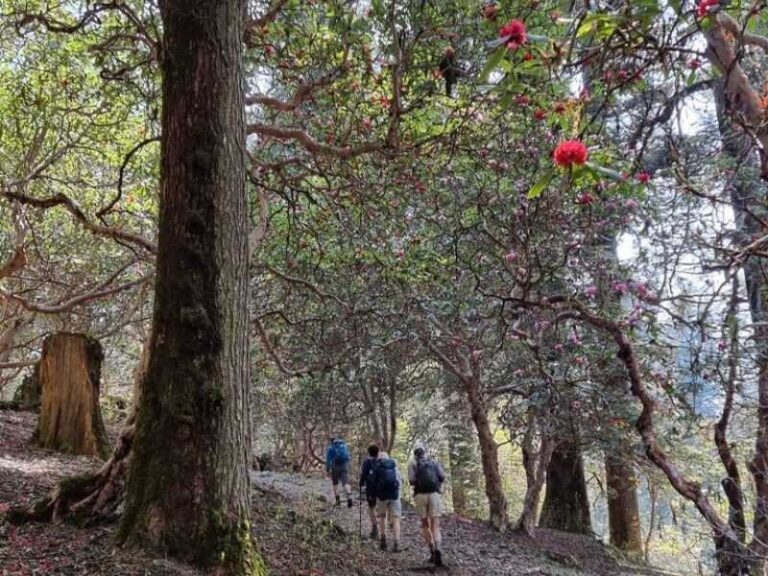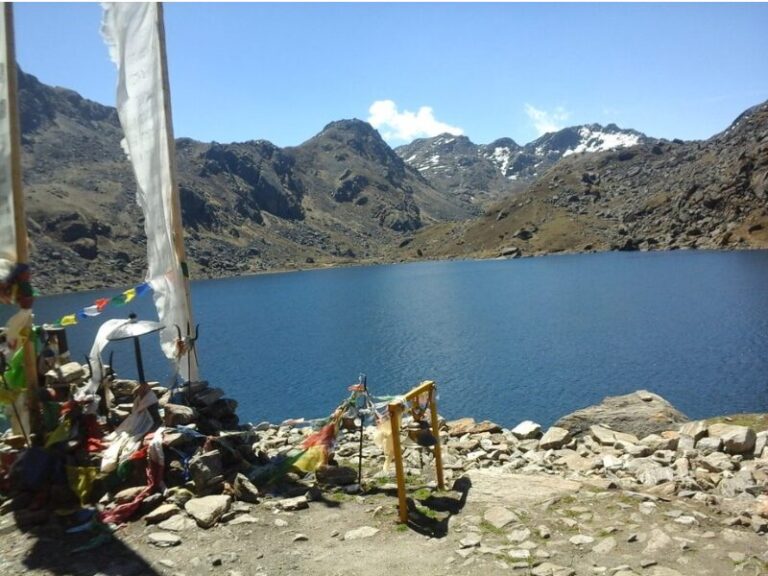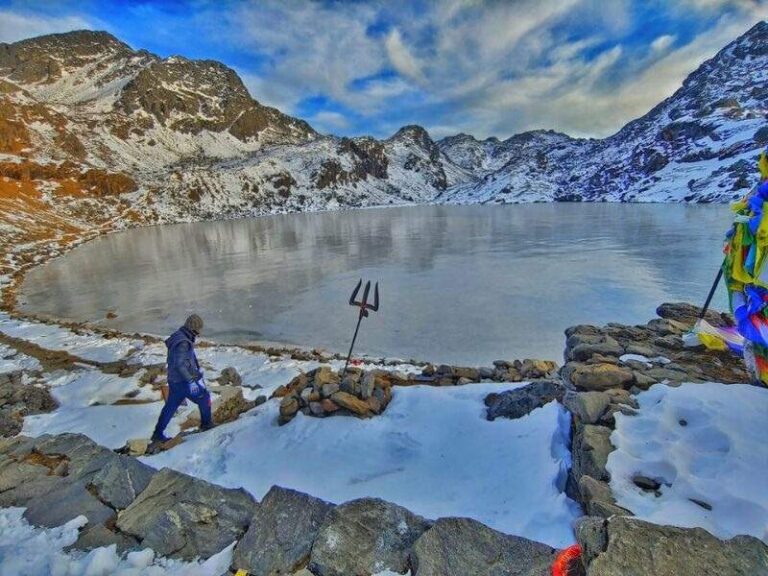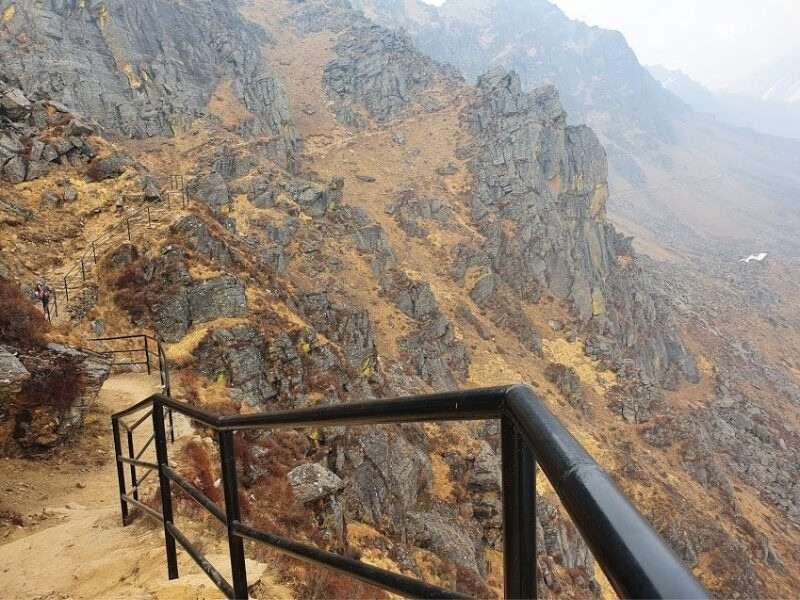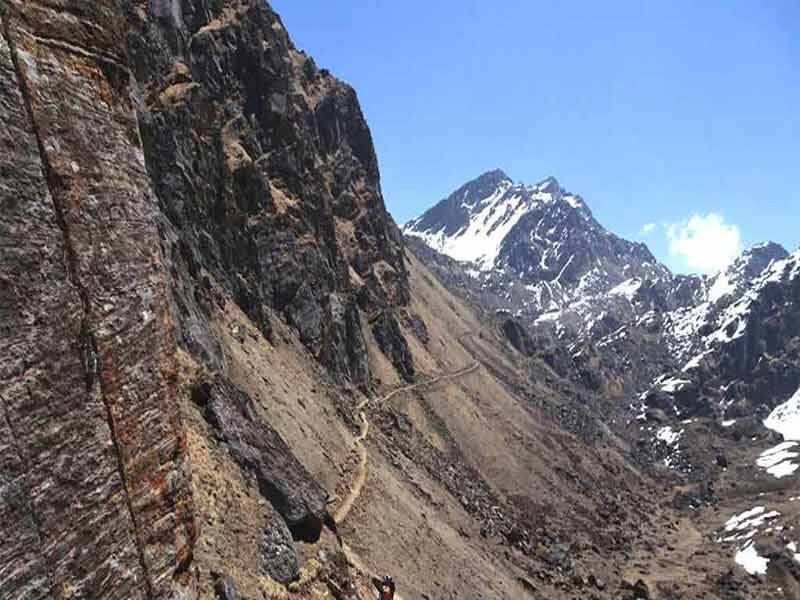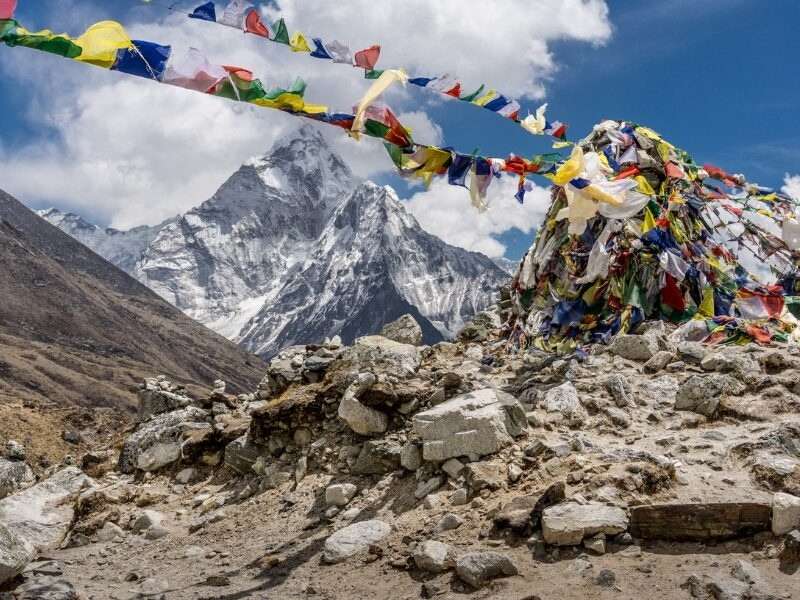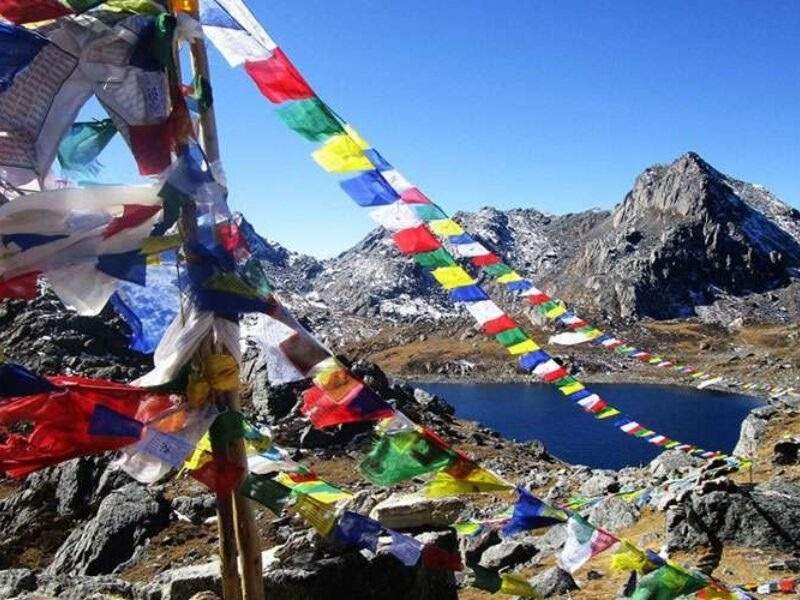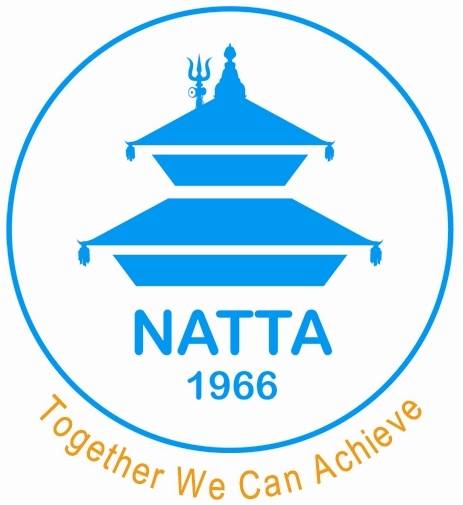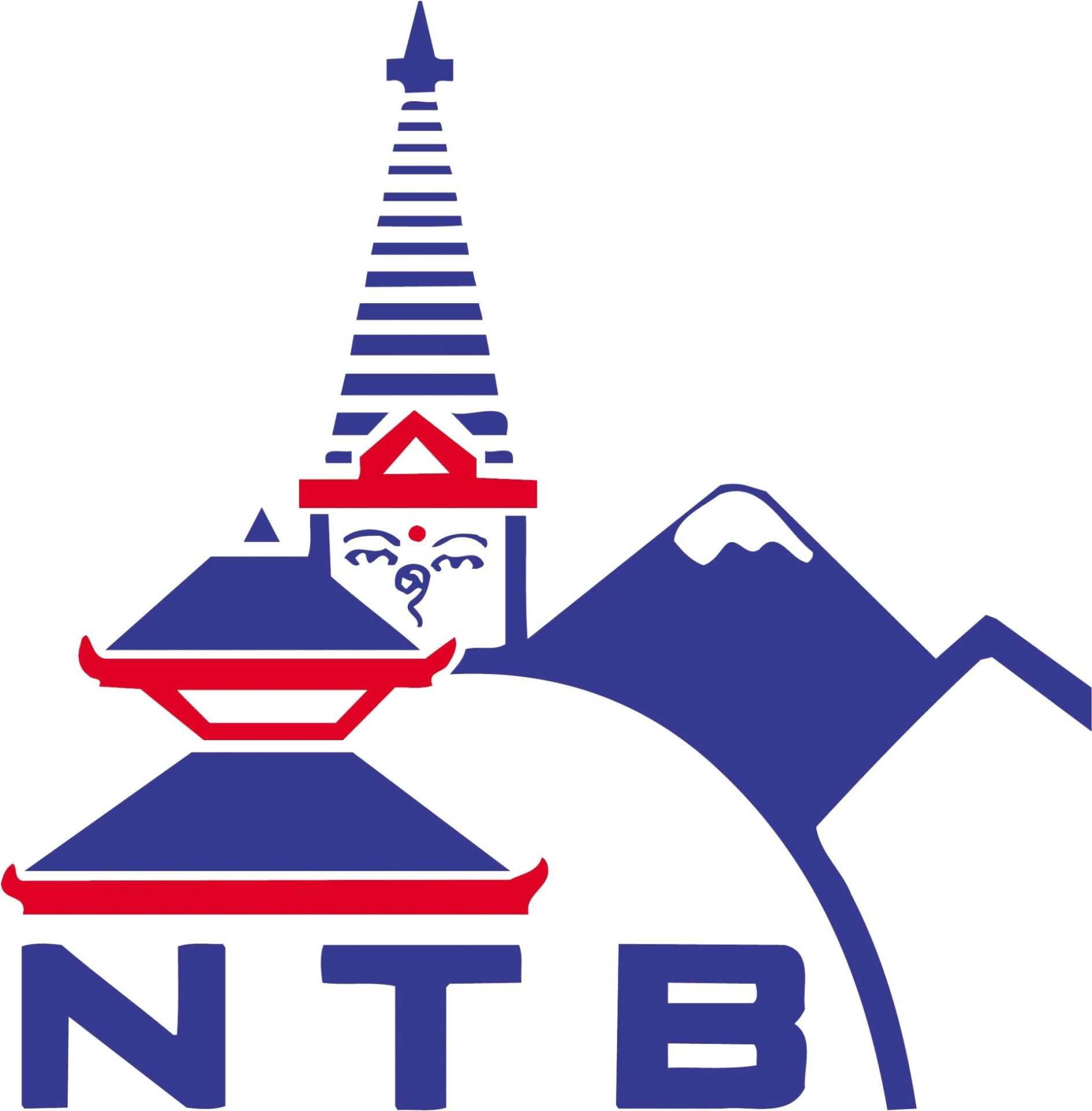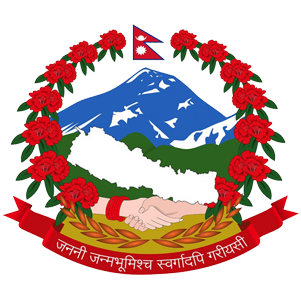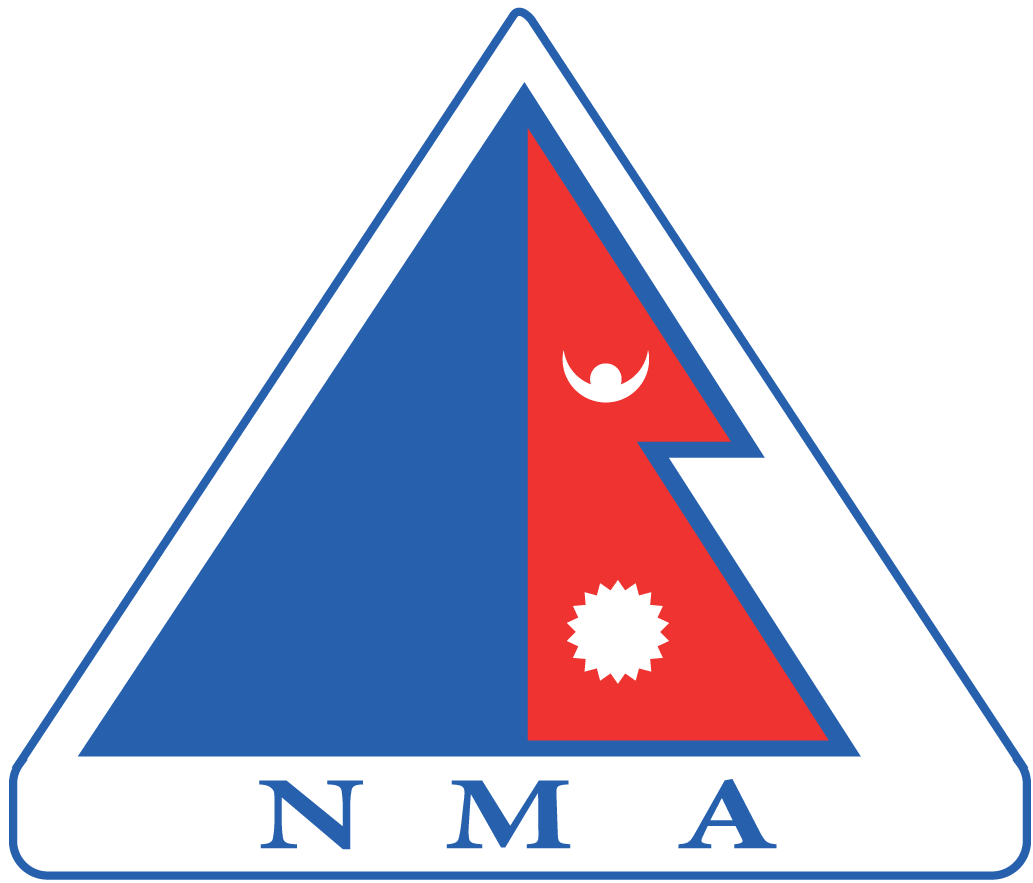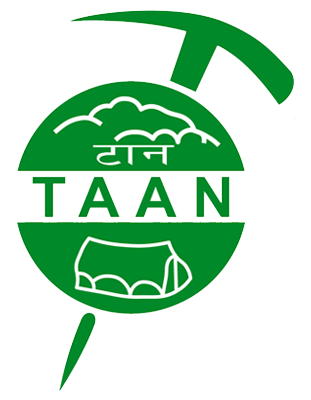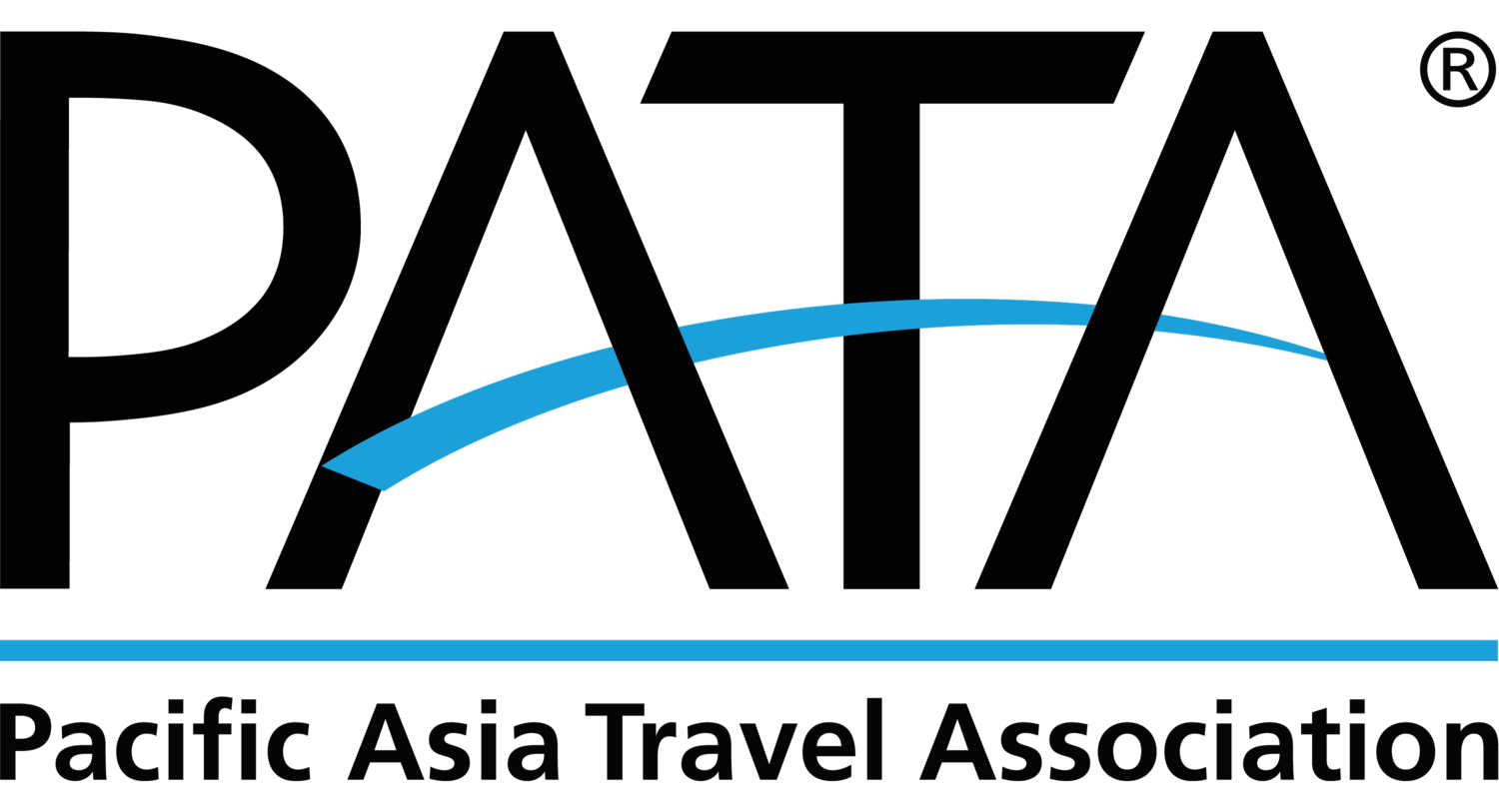Gosaikunda Trek
Trekking in the Langtang region of Nepal, around Gosaikunda Lake, is an experience unlike any other. The lake is situated in the centre of Langtang National Park. Trekking Gosaikunda is well known for its immersive cultural experiences, glistening alpine lakes, and stunning mountain vistas. Gosaikunda Lake, at 4,380 meters above sea level, is a holy pilgrimage site with great religious significance for both Buddhists and Hindus. You will get a taste of the rich Sherpa and Tamang traditions.
The Gosaikunda Trek promises an enlightening experience full of breathtaking landscapes, cultural insights, and a sense of accomplishment—perfect for both avid trekkers and spiritual seekers.
Trip Overview
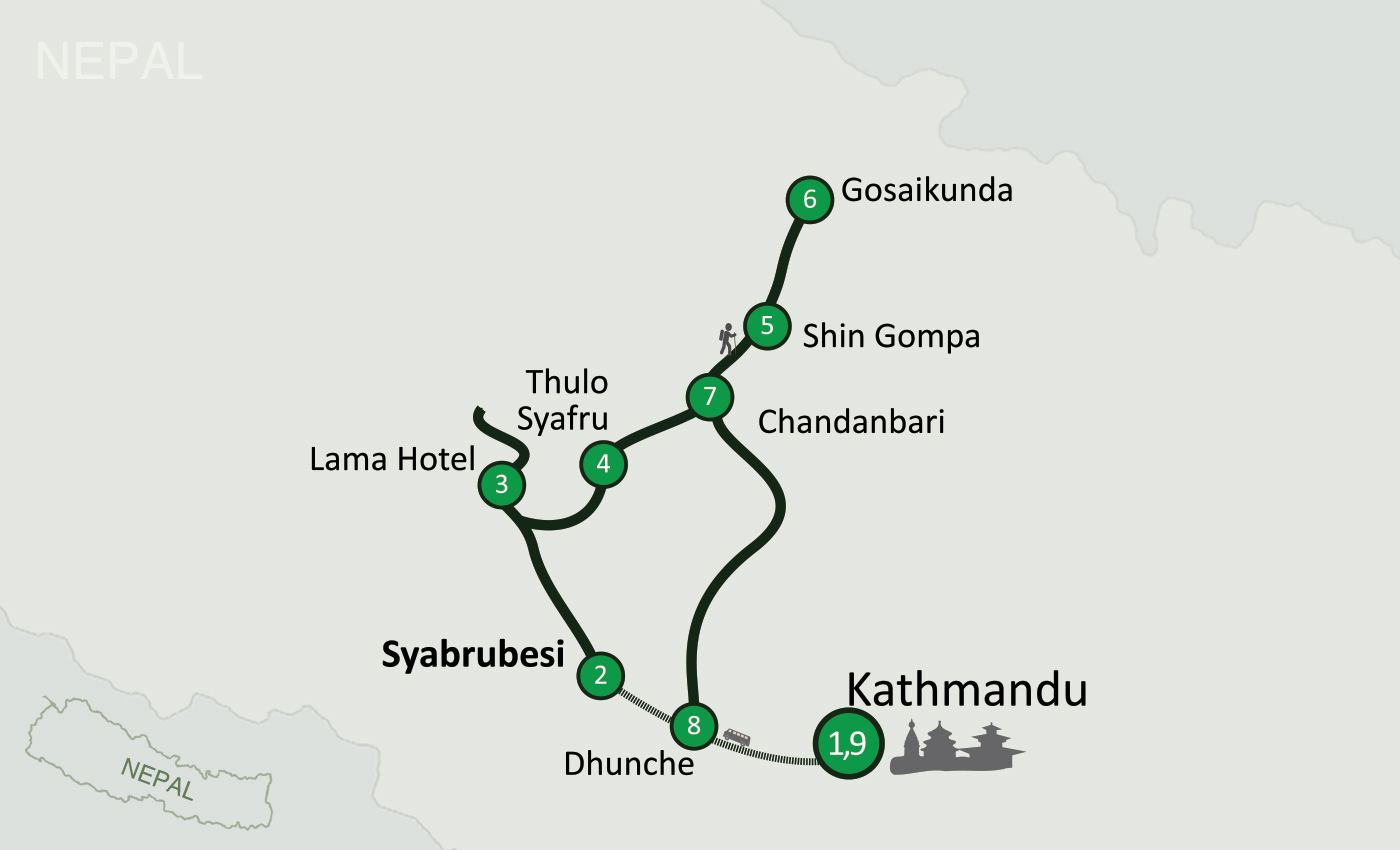
 Trip code: LR 101
Trip code: LR 101  Duration: 10 Days
Duration: 10 Days  Max Altitude: Gosaikunda (4380 m)
Max Altitude: Gosaikunda (4380 m)  Transportaion: Private Vehicle
Transportaion: Private Vehicle  Accomodation: Hotel / Lodge or Teahouse
Accomodation: Hotel / Lodge or Teahouse  Start: Kathmandu
Start: Kathmandu  End: Kathmandu
End: Kathmandu  Meals: European Plan
Meals: European Plan Outline Itinerary
Kathmandu (Arrival) – Transfer to Hotel (Private Transfer)
Kathmandu – Syabrubesi (Drive – Private Transfer)
Syabrubesi (1503 m; 7 hrs)Syabrubesi – Lama Hotel
Lama Hotel (2500 m; 6 hrs)Lama Hotel – Thulo Syafru
Thulo Syafru (2120 m; 5 hrs)Thulo Syafru – Shin Gompa
Shin Gompa (3350 m; 5 hrs)Shin Gompa – Gosaikunda
Gosaikunda (4380 m; 5 hrs)Gosaikunda – Chandanbari
Chandanbari (3250 m; 5 hrs)Chandanbari – Dhunche
Dhunche (2030 m; 6 hrs)Dhunche – Kathmandu
Kathmandu (1400 m; 6 hrs)Kathmandu (Departure)
Price Inclusion
- Airport transfers on a private vehicle
- Entire accommodation during the trek – 2 nights at hotel in Kathmandu hotel, and 7 nights in lodges/guesthouse during trek to Gosaikunda Trek
- Hotel Breakfast during the stay at Kathmandu
- Private tourist vehicle (Kathmandu / Syabrubesi) (Dhunche / Kathmandu)
- Experienced, government licensed, English-speaking or another language trekking guide
- All necessary permits for Langtang National Park and TIMS (Trekkers’ Information Management System)
- Porters during the trek for carrying luggage (1 porter for every 2 pax)
- All government taxes and administrative expenses
- Local staff insurances
Price Exclusion
- International flight tickets and Nepal Entry Visa
- Personal travel insurance
- Any expenses of a personnel nature, e.g., telephone calls, laundry, table drinks, etc.
- Any Tips to Guides, Drivers, and Trekking Staffs
- Any entrance fees for cameras and video cameras at the monuments
- Any other services not mentioned above
- Cost of any emergency evacuation, strikes, etc.
Detail Itinerary
Expand AllKathmandu (Arrival) – Transfer to Hotel (Private Transfer)
Upon your arrival in Kathmandu, our representative will welcome you at the airport and transfer you to your hotel. This is your starting point for the incredible Gosaikunda Trek.
Kathmandu – Syabrubesi (Drive – Private Transfer)
The journey kicks off with a scenic drive to Syabrubesi after a hearty breakfast. Along the way, you’ll be treated to stunning views of the Trishuli River, traditional villages, and terraced farms. On a clear day, the majestic Himalayan range, including Manasalu and Ganesh Himal, graces the horizon. Syabrubesi, a culturally diverse village, will be your destination for the day, where you can interact with the welcoming Tamang people and learn about their customs.
Syabrubesi – Lama Hotel
Today, your Gosaikunda trek begins with a departure from Syabrubesi towards Lama Hotel. The trail leads you through the heart of Langtang National Park, following the course of the Langtang River and the Bhote Koshi River. As you ascend, you’ll pass through lush rhododendron and oak forests, and upon entering the national park, you might even spot red pandas, bears, and monkeys.
Lama Hotel – Thulo Syafru
On this day, you’ll descend towards Thulo Syafru, taking a trail that meanders through bamboo forests, offering glimpses of wildlife and providing panoramic vistas of the surrounding landscapes. Thulo Syafru is a charming village that seamlessly blends Tamang and Sherpa cultures.
Thulo Syafru – Shin Gompa
After breakfast, the trail leads you towards Shin Gompa. You’ll pass through rhododendron and pine forests, reveling in breathtaking views of the Langtang Himalayas. As you traverse the national park and Tamang-inhabited villages, you’ll reach Shin Gompa, where you can explore the village and visit the local cheese factory.
Shin Gompa – Gosaikunda
Early morning breakfast with magnificent mountain views sets the tone for the day. Your trek towards Gosaikunda follows a rugged and narrow trail, ascending through slopes, mountains, forests, and dry scrub vegetation.
Along the way, you’ll be treated to magnificent views of Langtang Ri, Ganesh Himal, and the first glimpse of the holy lake, Gosaikunda. This pristine glacial lake holds great religious significance and is surrounded by smaller lakes, including Saraswatikunda, Bhairabkunda, and Surya Kunda.
Gosaikunda – Chandanbari
Begin your day with breakfast against the backdrop of the mountains and the serene lake. Your journey continues towards Chandanbari, descending all the way to Shin Gompa. As you pass through diverse landscapes, you may come across yaks grazing in high-altitude meadows. After traversing the barren trail and passing through small villages, you’ll reach Chandanbari.
Chandanbari – Dhunche
Today’s trail offers a mix of lush forested areas and open landscapes. En route to Dhunche, you’ll pass through pine forests, catching occasional glimpses of the mountains. Dhunche, a significant town in the Langtang region, serves as a hub for trekkers.
Dhunche – Kathmandu
After breakfast, embark on your journey back to Kathmandu. The 6-hour drive promises spectacular views of the Trishuli River and picturesque countryside, allowing you to savor the changing landscapes. Upon arrival in Kathmandu, you’ll be escorted to your hotel. In the evening, a farewell dinner awaits.
Kathmandu (Departure)
Depending on your flight schedule, our representative will accompany you to the airport. You may have some free time in Kathmandu before your departure, ideal for last-minute shopping or additional sightseeing.
Why you'll love this trip
- Gosaikunda Lake: Your journey will revolve around visiting the sacred lakes of Gosaikunda, Saraswatikunda, Bhairabkunda, and Surya Kunda. These pristine glacial lakes hold deep religious significance for both Hindus and Buddhists.
- Panoramic Mountain Views: As you trek, you’ll be treated to breathtaking views of the Langtang Lirung, Langtang RI, Ganesh Himal, Dorje Lakpa, and other towering peaks of the Langtang Himalayan range.
- Diverse Landscapes: The trail will lead you through a variety of landscapes, including enchanting rhododendron and bamboo forests, serene alpine meadows, and high-altitude pastures.
- Flora and Fauna: The Langtang National Park is home to an array of flora and fauna, from elusive red pandas to bears and playful monkeys.
- Cultural Immersion: Immerse yourself in the local culture, traditions, and warm hospitality of the Tamang community, whose unique way of life enriches your journey.
When To Visit
The best time to go on the Gosaikunda trek is during the spring (March to May) and autumn (September to November) seasons. With clear skies and great visibility of the magnificent Himalayan landscapes, these times of year bring about generally stable weather. Autumn offers crisp, clear views and pleasant trekking temperatures, while spring brings bright rhododendron blooms along the trail. For the Gosaikunda trek, the monsoon season (June to August) is less conducive because of rain, landslides, and leech-infested trails. Winter (December to February) is difficult because of severe weather and a lot of snowfall.

Cannot see your date or not satisfied with the itinerary? We may be able to add new trip dates.
Contact UsElevation Chart
Trip Gallery
FAQs for Gosaikunda Trek
How difficult is the Gosaikunda Lake Trek?
The Gosaikunda Lake Trek is considered moderately challenging. The trek involves both ascents and descents, and the high altitude can be physically demanding. It is advisable for trekkers to be in good physical condition and acclimatize properly to minimize the effects of altitude.
What permits are required for the Gosaikunda Lake Trek?
Trekkers need two main permits: the Langtang National Park entry permit and the TIMS (Trekkers’ Information Management System) card. These permits can be obtained in Kathmandu or Dhunche before starting the trek.
Can Gosaikunda Lake be visited year-round?
While the trekking season is mainly in spring and autumn, Gosaikunda Lake can be visited throughout the year. However, winter brings heavy snowfall, making the trek more challenging, and the monsoon season (June to August) poses risks of landslides and difficult trail conditions.
What are the emergency procedures in cases of altitude sickness or other issues?
In cases of altitude sickness or other emergencies, descend to a lower altitude immediately and seek medical assistance. Carrying a basic first aid kit, knowing the signs of altitude sickness, and having emergency contact information are essential for a safe trek. Trekkers are advised to have travel insurance that covers medical evacuation if needed.
Is it necessary to hire a guide and/or porter for the trek?
While it’s possible to trek independently, many trekkers choose to hire a guide and/or porter, especially if they are not familiar with the area or high-altitude trekking. Guides can provide valuable insights into the local culture, navigate the trail, and ensure safety.

